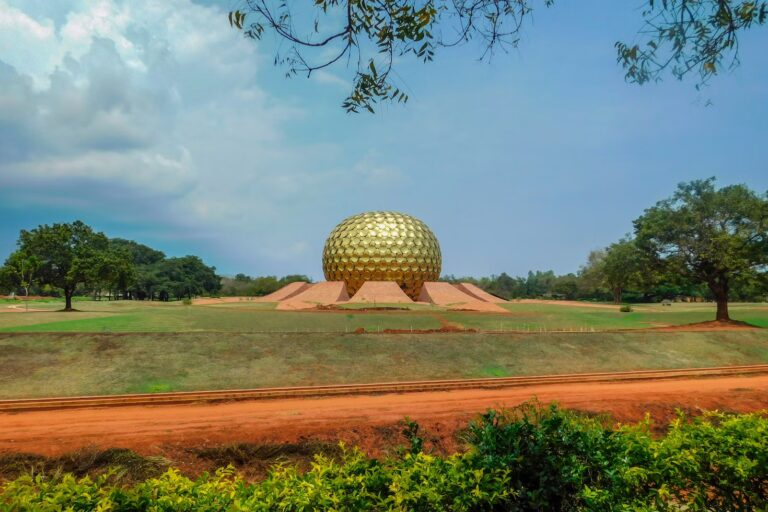Pondicherry, known for its serene beaches and colonial architecture, is also a haven for spirituality, offering a peaceful escape for those seeking divine tranquility. With the cooler weather setting in November and December, it’s the perfect time to explore the city’s ancient temples and spiritual sites, each telling a unique story of Pondicherry’s rich cultural heritage. Whether you’re a devotee or simply looking to explore, these spots will fill you with a sense of peace and awe.
- Sri Aurobindo Ashram
Located in the heart of Pondicherry, the Sri Aurobindo Ashram is one of the most prominent spiritual centers in India. Founded by Sri Aurobindo and the Mother (Mirra Alfassa), the Ashram offers a quiet, contemplative space to meditate and connect with higher consciousness. In the months of November and December, the atmosphere is particularly serene, making it an ideal time for introspection and spiritual reflection.
Highlights:
- Beautiful, peaceful surroundings
- Dedicated meditation spaces
- The Samadhi of Sri Aurobindo and the Mother
- Manakula Vinayagar Temple
This famous temple dedicated to Lord Ganesha is an ancient shrine with roots that go back over 500 years. It’s one of the oldest and most revered temples in Pondicherry. During the cooler months, the temple’s vibrant festivals and rituals create an atmosphere of devotion and celebration. Visitors can marvel at the intricate architecture and the golden statue of Ganesha, which is a centerpiece of the temple.
Highlights:
- Historic significance and architecture
- Vibrant festivals during November and December
- Spiritual energy and calm for visitors
- Immaculate Conception Cathedral
A stunning example of French colonial architecture, the Immaculate Conception Cathedral stands as a symbol of Pondicherry’s multicultural past. The cathedral’s serene interior provides a sense of peace, and the cool months of November and December make it a perfect time to attend mass or simply enjoy the ambiance. The church’s beautiful design and spiritual significance make it an essential stop for anyone exploring Pondicherry’s spiritual sites.
Highlights:
- Beautiful French colonial architecture
- Peaceful environment for reflection
- Historical and spiritual significance
- Arulmigu Manakula Vinayagar Temple
Situated on the main street of Pondicherry, this popular temple is dedicated to Lord Ganesha and is famous for its impressive architecture and historical significance. With its vibrant rituals, the temple sees an influx of pilgrims, especially in the cooler months when the crowds are slightly more manageable, offering visitors a chance to participate in the temple’s traditions and offerings.
Highlights:
- Vibrant rituals and celebrations
- Magnificent gopuram (temple tower)
- Unique connection to Pondicherry’s spiritual community
- Chidambaram Nataraja Temple (Nearby)
Though just a short drive from Pondicherry, the Chidambaram Nataraja Temple is a must-visit for those seeking divine spirituality. Dedicated to Lord Shiva as Nataraja (the cosmic dancer), this temple is a spiritual marvel with intricate sculptures and a deep history. November and December, especially around festivals like Shivaratri, offer an intense spiritual experience, making it an ideal destination for devotees.
Highlights:
- Sculptural beauty and grandeur
- Rich history of spirituality and dance
- Proximity to Pondicherry
- Varadaraja Perumal Temple
The Varadaraja Perumal Temple, located in the serene town of Cuddalore, is another stunning temple near Pondicherry. Known for its impressive architecture and the detailed carvings of gods and goddesses, this temple is a peaceful site for devotion and reflection. The cooler months make for an excellent visit, especially during religious festivals in December.
Highlights:
- Majestic architecture and design
- A peaceful space for spiritual visitors
- Lesser-known, quieter experience
- Auroville – Matrimandir
Though technically not a temple in the traditional sense, Auroville and the Matrimandir serve as a universal spiritual center. The golden dome of the Matrimandir stands as a symbol of human unity and peace. For those seeking a deeper connection to their inner selves, the tranquil environment of Auroville during the months of November and December offers the perfect space for meditation and reflection.
Highlights:
- Unique spiritual concept of unity
- Meditation spaces and serene surroundings
- A peaceful community atmosphere
Stay at Mango Hill Hotels in Pondicherry for a Spiritual Getaway
If you’re planning to visit Pondicherry’s spiritual sites, Mango Hill Hotels offers a perfect stay for those looking for peace and comfort during their trip. Located in serene surroundings, Mango Hill’s hotels in Pondicherry, including Mango Hill La Serene and Mango Hill Pondicherry, offer a tranquil retreat where you can unwind after your spiritual explorations. With warm hospitality, modern amenities, and proximity to the city’s key spiritual landmarks, Mango Hill Hotels ensure you experience both comfort and spirituality.
Why Choose Mango Hill Hotels?
- Conveniently located near Pondicherry’s spiritual hotspots
- A peaceful and rejuvenating environment
- Ideal for both relaxation and exploration
- Personalized services for a truly spiritual getaway
Conclusion
Pondicherry’s temples and spiritual sites offer a rich and varied experience for those seeking to connect with the divine. Whether you visit the ancient temples, colonial churches, or modern spiritual centers, the city provides a perfect balance of history, culture, and spirituality. And, with a stay at Mango Hill Hotels, you can ensure that your journey is both spiritually fulfilling and physically comfortable.
Ready to explore Pondicherry’s temples this November and December? Book your stay with Mango Hill Hotels and embark on a transformative spiritual journey.


